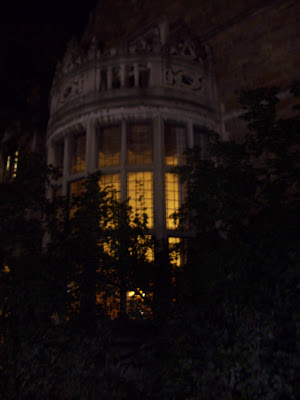Ann Arborites
have their choice of pizza places. Such destinations appear on many a
street, and at times, may seem like a dime a dozen. Silvio’s Organic Pizza,
however, stands out in my mind.
Little
personal touches curate Silvio’s warm character. A billboard of
eclectic children’s drawings decorates a wall. Fresh herbs grow on a shelf,
tinting the surrounding room with a ‘cultivation’ vibe.
Calling
Silvio’s a pizzeria is a marked understatement, as it is an organic Italian
restaurant that also offers an assortment of pasta, calzones, soups, salads,
desserts, and drinks. A personal favorite is the savory Eggplant
Parmigiana, served with a choice of pasta. I, myself, prefer a spaghetti
accompaniment.
Founder and
owner Silvio Medoro was born in New York but lived in Italy for twenty-five
years. Authentic Italian cooking methods chiseled his culinary style throughout
his tenure working at a bakery in Italy. “His dream was always to come back to
the US and open a pizzeria,” explains Jes Rose, a manager at Silvio’s.
Inseminated in 2005, Silvio’s has gradually expanded in terms of physical space and menu
variety. Seasonal selections along with a variety of beer and wine now grace
dining options. Ichabod Pumpkin Ale and Cappellotti with Pumpkin and Truffle
Oil are two current choices. “We strive to show the public that we care about
what they eat,” proclaims Rose.
Rose received
a job offer at Silvio’s while taking photos one day in the eatery. As a
photographer, she embraces the responsibility of photographing foods for the
menu amongst other duties. “It is the best photography I’ve ever done,” she
flaunts.
“We create a
fine line between traditional Italian [culture] and a nice local community,”
says Rose. Locally manufactured beer sits alongside imported Italian beer, for
instance.
Medoro,
himself, cultivates a resourceful vegetable garden in his backyard. “We get as
much as we can from local farms,” states Rose. The Ann Arbor Farmer’s Market, Peoples’ Food Co-op, and Zingerman’s supply several goods to Silvio’s as
well. A harmonious functionality between local businesses seems to have
sprouted.
Commitment
to purchasing organic products conjoined with organic food preparation methods
defines Silvio’s quality standard. Even if a situation pops up where the
restaurant cannot be completely organic in preparing an entree, staff persists
to use as many possible organic cooking steps nonetheless.
Staff members
create everything from scratch. They prepare soup, for example, starting with merely
water, then add vegetables, meat, and herbs accordingly.








































